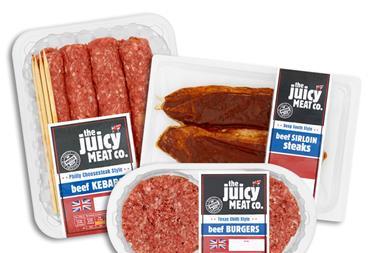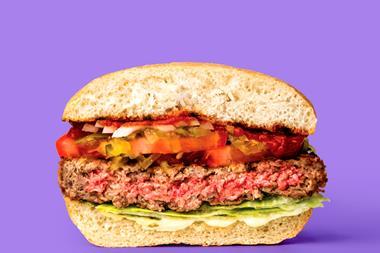The meat-free trend keeps on growing, with new plant-based brands like Beyond Meat getting plenty of media attention as well as gaining listings in major supermarkets. At the same time, retailers like Waitrose and Sainsbury’s are overhauling their merchandising strategies to create dedicated fixtures for vegan products and co-siting plant-based alternatives next to meat products.
All this is driven by growing consumer demand, brands and retailers say, but where exactly is that demand coming from? And what is driving it?
We teamed up with Harris Interactive to explore the plant-based trend - and shopper attitudes towards it - in some more detail.
How many consumers are avoiding meat?
The overwhelming majority of British shoppers describe themselves as meat eaters, with just 2% identifying as vegan, 4% as pescatarian and 6% as vegetarian.
However, there is considerable variation between age groups, with younger groups much more likely to avoid meat.
The highest proportion of meat avoiders can be found among 25-34 year olds, of whom 18% say they don’t eat meat.
There is also significant variation between different British regions, with London having the highest proportion of meat avoiders, followed by Wales.
The region with the lowest proportion of meat avoiders is the North West, where just 9% of consumers say they don’t eat meat.
How many shoppers are looking to reduce their meat consumption?
While most Brits consider themselves meat eaters flexitarianism is on the rise, meaning more are considering cutting back on their meat consumption (as opposed to giving it up completely).
This trend is especially evident in younger age groups, where a third of those under 35 say they are looking to eat less meat in the next 12 months.
While other age groups do not plan to cut back to the same extent, 25% of Brits across all age groups agree we should all be trying to eat less meat, rising to 30% for those in London.
What concerns do shoppers have about meat?
The majority of meat eaters say they are not worried about the ethics or environmental impact of their meat consumption.
More data: Shopper attitudes towards meat traceability in 10 charts
For the rest, animal welfare trumps ethics and environmental concerns, with a third saying they are increasingly worried about welfare in meat production. This rises to as much as 37.3% for female shoppers.
When asked specifically about health in the context of meat consumption, meanwhile, the youngest age group shows the biggest concerns about cancer risk.
Indeed, across the board younger shoppers tend to be more concerned about their meat consumption - and, conversely, more open to plant-based alternatives - than older consumer groups.
This is likely to be a key concern for meat companies, which have to be mindful that consumer attitudes are changing rapidly and younger shoppers can have vastly different attitudes towards their products than older consumers.
However, it’s not all bad news for the meat sector.
Significant numbers of consumers across all age groups recognise the importance of meat to a healthy diet, with a third believing eating meat is the best way to ensure you get enough protein.
What do shoppers think about meat alternatives?
There has been a flurry of new plant-based launches recently, meaning consumers interested in giving plant-based eating a try have more choice than ever.
Having said this, the sector appears to have some way to go to persuade meat eaters (which plant-based brands are increasingly targeting) that meat-free options are worth the money.
As highlighted above, younger consumers appear to be much more open towards meat-free alternatives than older shopper groups.
Unsurprisingly, vegans, vegetarians and pescetarians are much more favourable towards plant-based alternatives than meat eaters.
There is, however, one surprising area of agreement between vegans and meat eaters: the same percentage of both groups believe plant-based alternatives are junk foods and meat avoiders would be better off eating more fruit & veg instead.
How do shoppers feel about the public debate about veganism?
The plant-based trend has been accused, at varying times, of being overplayed by vegan and vegetarian advocates, and there is some evidence in our survey to suggest shoppers agree, with 32.6% saying they believe there is too much hype about plant-based eating at the moment.
The survey also points to a need for clearer, more authoritative information about meat production and plant-based eating, with a quarter of respondents across all age groups expressing concerns about the quality of information available to them and the same number saying the meat industry is not doing a good enough job addressing concerns about meat consumption.
That even a third of vegans say they are unsure whether plant-based eating is genuinely better than eating meat highlights the need for better and clearer information for consumers.



















No comments yet